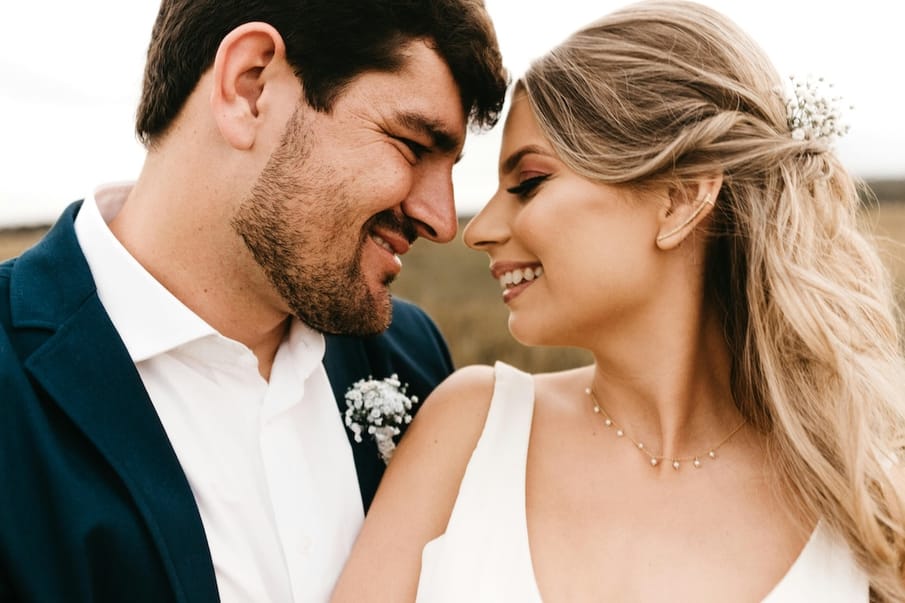Weddings can be some of the happiest – and most stressful – days of our lives. So, how can you ditch the stress, and refocus on what really matters on your wedding day?
Weddings are a celebration of love, commitment, and family. So, why do so many of us find planning them so stressful? One 2023 survey from wedding planning app Zola even found that an overwhelming 94% of us feel stressed while planning our big day.
If you stop to think about it, it’s no wonder it can be a stressful time when you’re trying to juggle managing your budget, family and personal expectations, finding a location, and catering for different dietary requirements, alongside hunting down the right outfits, invitations, and colour scheme. It’s stressful just writing it all down, and that’s only a fraction of the tasks many couples will complete. And let’s not forget, we typically give ourselves just 12 to 18 months between getting engaged and tying the knot. That’s a lot for anyone to handle.
So, what can you do to avoid feeling stressed, overwhelmed, and anxious while planning your wedding? To get the inside scoop on the best advice, who better to ask than counsellors and psychotherapists who’ve been there themselves? Here are their transformative top tips:
Identify what matters to you
Counsellor and clinical supervisor Jacqui Parkin says deciding your true non-negotiables early on can have a huge impact.
“It can be tempting to get stuck into the finer details about your special day, but searching for perfection can be a recipe for stress. Write down your top non-negotiables (maybe your ideal venue, your perfect colour scheme, your key bridesmaids) and get those locked in. Anything else can be considered a ‘nice to have’, but you can move forward stress-free, knowing that the essentials for your dream day are in the bag.”
Delegate, delegate, delegate
“Choose a good support team and delegate, delegate, delegate. You don’t have to do it all yourself – honestly!” Jacqui says. “The most effective organisers have a list of trusted contacts to call upon for advice or practical help. Pick two or three people you can depend upon and bring them into your circle of wedding planning trust. Sitting down, sharing your vision and expectations, and then dividing up tasks according to skills and temperament can bring immediate relief – your only job is then to arrange periodic updates so that you all know where you’re at.”
Don’t give away too many details
Recently married psychotherapist Justine Sheedly found that too much advice and input could lead to putting others’ ideas and wishes before their own.
“Taking wedding advice from others is challenging and, more frequently, the happy couple can be seen taking steps to please their guests above themselves. Be vague when others ask you questions about your forthcoming nuptials, leaving less room for discussion and suggestions, and more time to focus on what you both want.”
Make time to relax together before your big day
Having time out to connect together, away from the stress of wedding planning, work, and everyday life, can have a significant impact on your mood.
“Have a weekend or night alone together, reminding yourselves why you’re getting married,” suggests Justine. “Play games, have fun, enjoy each other.”
Justine also reminds us that it’s normal to have a dip in our moods after the big day. “Once the wedding is over, a drop in stress hormones can make us feel more anxious, tired, and low in mood. Like holiday blues, the brain has exaggerated the ‘return to normal function’ to make it feel more mundane and less attractive.”
It can be helpful to plan some gentle days or evenings together for after your wedding and honeymoon, to help you readjust to ‘normal’ life.

Focus on your vision and avoid people-pleasing
It can be easy to fall into the trap of trying to please everyone else and letting your own wants, needs, and desires for your big day fall by the wayside. When psychotherapist and counsellor Lorraine Collins got married, to reduce stress and anxiety levels, they decided to have an intimate wedding.
“My family heritage is Jamaican, and weddings have always been an excuse for a full-on party. At the time I decided to get married, it coincided with my ongoing struggle with anxiety. The idea of being the centre of attention filled me with dread. After a long time trying to figure out what was best, my partner and I decided to get married in Jamaica with just four guests. Our family were none too pleased, but respected our wishes.
“We later had a party back in the UK for friends and family. I could sense we’d disappointed some family members and friends. Yet looking back, it was probably the turning point in my life – overcoming people-pleasing.”
It can be difficult to put yourselves first (as individuals and a couple), but it’s important to remember that your big day is about you, and should make you happy. Making big decisions can be tough, but as Lorraine explains, it can have a huge impact on how you feel leading up to – and thinking back on – your wedding day.
“The decision was a difficult one. I felt guilty about not meeting other people’s expectations. Realising how important my own mental health and peace of mind were helped me to make the decision. It wasn’t my responsibility to manage the disappointment of others.”
Communication is key
Be open about how you’re feeling with your partner, family, and friends. It’s natural to feel some level of stress when planning your big day, but the people around you may not be aware of just how much it’s affecting you.
Psychotherapist and trauma specialist Tina Chummun shares why communication is so important at this time. “Effective communication between couples is crucial in managing stress and overwhelm during wedding planning. Research shows open and honest communication helps reduce stress levels, and promotes better problem-solving skills.
“It’s essential for couples to express concerns, discuss expectations, and delegate responsibilities to avoid conflicts and promote support. This is especially true when there are conflicting values, beliefs, and ways of doing things from all parties which can intrude on what the couple actually want. There are cultures where over-involvement of family members can override the wishes of the bride and groom, and in such cases, healthy boundaries need to be established.”
It’s also important to ensure that you and your partner are communicating effectively. Take time to catch up together to make sure you’re on the same page and to avoid any accidental misunderstandings. Hopefully that way, you can take the big stress out of your big day, and instead focus on making some magical memories together.


Comments